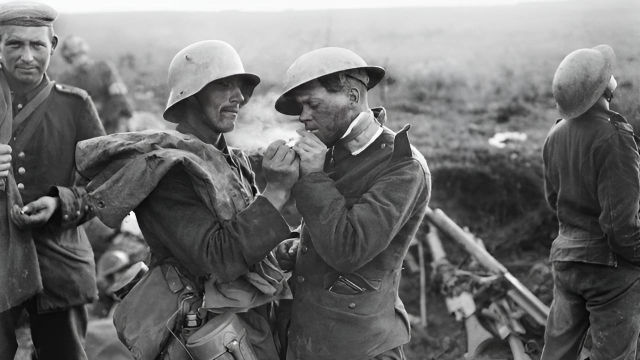They stopped a war for Christmas
- WatchOut News

- Nov 30, 2019
- 4 min read
Updated: Nov 19, 2024
In the history of Christmases, few events have been as remarkable as the Christmas Truce of 1914. On that Christmas Day, thousands of British, French and German troops in the trenches of the Western Front spontaneously stopped fighting and met in no man's land to engage in acts of celebration and friendship.
World War I had been going for about five months and more than a million men faced off along an 800km (500mi) front from the Belgian coast to the Swiss border. The narrow strip of mud and wire between them was already strewn with corpses. Before the war's end in 1918, more than 10 million soldiers would die. But on this day, a few small acts of empathetic Christmas cheer spread by direct contact, field telephone and messenger saw peace break out in many pockets and sizeable areas before senior officers could do anything about it. The soldiers didn't just stop shooting at each other, they sang Christmas carols across the killing fields, met halfway, shook hands, exchanged food and gifts, viewed family photos and kicked around footballs (made of straw and string or jam boxes if the genuine article wasn't handy). The story has had its doubters over the decades, but it has been well-documented in two books, one from each side.
In 1984, Christmas Truce, by Malcolm Brown and Shirley Seaton, was published in London as a follow-up to their BBC documentary Peace in No Man's Land; and in 2003, Der Kleine Frieden im Großen Krieg (The Small Peace in the Big War) was a best-seller in German author Michael Jurgs' home country. There have also been one or two children's books on the subject.
In the United States, radio stations sometimes give Wisconsin folk musician John McCutcheon's 1984 song 'Christmas in the Trenches' a seasonal spin: My name is Francis Tolliver. I come from Liverpool.
Two years ago the war was waiting for me after school.
To Belgium and to Flanders, to Germany to here,
I fought for King and country I love dear.
It was Christmas in the trenches where the frost so bitter hung.
The frozen field of France were still, no Christmas song was sung.
Our families back in England were toasting us that day,
their brave and glorious lads so far away.
I was lyin' with my mess-mates on the cold and rocky ground
when across the lines of battle came a most peculiar sound.
Says I "Now listen up me boys", each soldier strained to hear
as one young German voice sang out so clear.
"He's singin' bloddy well you know", my partner says to me.
Soon one by one each German voice joined in in harmony.
At the time, the truce was covered in British newspapers keen on the fair play angle, but German papers ignored it, presumably because it didn't reflect well on the Army's renowned discipline.
Jurgs wrote that the fraternization movement lasted only a few hours in most places, but lingered in some for several weeks, with soldiers choosing to shoot above the enemy's heads. If there had been live television footage at the time and people had seen the pictures of this truce, it would have been the end of the war, Jurgs told the Guardian.
His claim that the truce was instigated by the German side drew some media attention. He has the benefit of a German lieutenant's diaries found in an attic near Leipzig in 1999. Lieutenant Kurt Zehmisch had been a schoolteacher who spoke English and French. Writing in obscure shorthand for secrecy, he described how the shooting suddenly stopped on Christmas Eve and someone from his regiment wolf-whistled and the enemy whistled back. A soldier in Zehmisch's company called out in English and a conversation developed. A couple of soldiers from each side climbed out of their trenches and shook hands, wished each other a merry Christmas and agreed not to shoot the next day. "Afterwards, we placed even more candles than before on our kilometer-long trench, as well as Christmas trees," wrote Zehmisch. "The British whistled and clapped. It was a wonderful, if somewhat cold, night." Jurgs notes that the truce was especially strong in a 50km (30mi) stretch around Ypres in Belgium, and that an Austrian soldier billeted near the town complained that such behavior should not be allowed in wartime. His name was Adolf Hitler. Stories of the British beating the Germans in an hour-long football match have emerged over the years, but seem unlikely. Exhaustion was widespread and the landscape was far from suitable. The books have first-hand accounts of signs being held up, "You no shoot, we no shoot", and the singing of Christmas carols, especially 'Silent Night', instigating some contacts. One Englishman set up a free barber's service in no man's land, with no regard for which side the hair parted on. After everyone went back to annihilating each other, the British commander-in-chief, Sir John French, wrote: "I issued immediate orders to prevent any recurrence of such conduct, and called the local commanders to strict account." Warfare would never be the same again.
Related article(s):


.png)




Comments